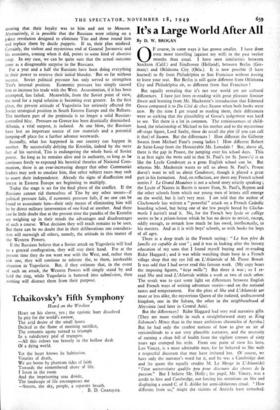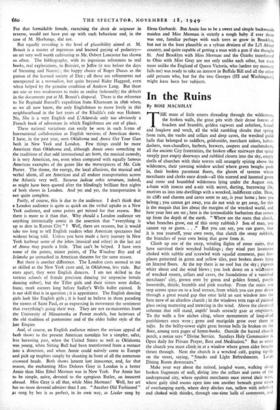It's a Large World After All
By D. W. BROGAN 0 F course, in some ways it has grown smaller. I have done even more travelling (against my will) in the past twelve months than usual. I have seen similarities between Stockton (Calif.) and Eindhoven (Holland), between Berlin (Ger- many) and Oklahoma City (Okla.). It is now possible (I have learned) to fly from Philadelphia to San Francisco without having to leave your scat. But Berlin is still quite different from Oklahoma City and Philadelphia oh, so different from San Francisco !
But equally revealing that it's not one world yet arc cultural differences. I have just been re-reading with great pleasure Sinister Street and learning from Mr. Mackenzie's introduction that Edmund Gossc compared it to Du Cote de chez Swann when both books were new. By the time I got round to reading them, their differences were so striking that the plausibility of Gosse's judgement was hard to see. Yet there is a lot in common. The reminiscences of child- hood, the relationship of Michael to his mother and to the mysterious off-stage figure, Lord Saxby, these do recall the plot (if you can call it that) of Swann. But the differences ! How different the Gilberte Swann from Michael Fanc's young ladies 1 How different Robert de Saint-Loup from the Honourable Mr. Lonsdale ! But, above all, there is the gap in Proust, the jumping over his school days. Thia is at first sight the mote odd in that St. Paul's (or St. James's) is as like the Lycie Condorcet as a great English school can be. But whereas Mr. Mackenzie wants to tell us about St. Paul's, Proust doesn't want to tell us about Condorcet, though it played a great part in his formation. And, on reflection, are there any French school stories ? Le Grand Meaulnes is not a school story strictly speaking ; the Lye& of Nantes in Barris is nearer Eton, St. Paul's, Repton and the other schools from which our young men of letters still emerge on the world, but it isn't very near. I am told that the author of Clochemerle has written a " powerful " attack on a French Catholic boarding school, but being one of the few people bored by Cloche- merle I haven't read it. No, for the French boy lycie or collige seems to be a prison-house which he has no desire to revisit, except, oddly enough, to remark how much he has owed, intellectually, to his masters. And as it is with boys' schools, so with books for boys of all ages.
There is a deep truth in the French saying: "Le bon Ore de famine est capable de tout" ; and it was in looking after the literary education of my sons that I found myself buying and re-reading Rider Haggard ; and it was while watching them busy in a French village shop that my eye fell on L'Atlantide of M. Pierre Benoit. It was odd that I had never read this famous work. (My copy bears the imposing figures, " 6o3e milli.") But there it was ; so I re- read She and read L'Atlantide within a week or two of each other. The result was to cast some light on differences between English and French ways of writing adventure stories—and on the national tastes and temperament. For the plots of She and L'Atlantide are more or less alike, the mysterious Queen of the isolated, undiscovered kingdom, one in the Sahara, the other in the neighbourhood of Abyssinia (and later in Central Asia).
But the differences! Rider Haggard had very real narrative gifts. (They are more visible in such a straightforward story as King Solomon's Mines than in the more ambitious chronicles of Aycsha.) But he had only the crudest notions of how to give an air of verisimilitude to a not very plausible narrative, and the necessity of earning a clean bill of health from the vigilant censors of sixty years ago cramped his style. From one point of view his hero, Leo Vincey, is a most admirable man, for he behaved to She with a respectful decorum that may have irritated her. Of course, we have only the narrator's word for it, and he was a Cambridge don and (to quote the equally erudite M. Le Mesge in L'Atlantide) "l'itat universitaire qualifte peu pour discourir des chases de la passion." But I believe Mr. Holly ; his pupil, Mr. Vincey, was a credit to him and Cambridge, not forcing his attentions on She and displaying a sound C. of E. dislike for semi-idolatrous ritual. " How different from us," might the victims of Antinea have remarked.
For that formidable female, exercising the droit de seigneur in reverse, would not have put up with such behaviour and, in the case of M. Morhange, did not.
But equally revealing is the level of plausibility aimed at. M. Benoit is a master of ingenious and learned guying of pedantry—
an art very well worth cultivating as Mr. Osbert Lancaster has shown so often. The bibliography, with its ingenious references to real books, real explorations, to Boissier, to Joffre (it was before the days of Stenning and Norris) ; the happy choice of Roger Ducos as the patron of the learned society of Dax ; all these are refinements not unexpected in a normalien, but quite beyond Rider Haggard, even when helped by the genuine erudition of Andrew Lang. But there arc one or two weaknesses to make us realise (tolerantly) the defects in the documents put at M. Benoit's disposal. There is the reference to Sir Reginald Russell's expedition from Khartoum in 1896 when, as we all now know, the only Englishman to move freely in this neighbourhood in the last years of the Khalifa's rule was Holmes. No, She is a very English and L'Atlantide only too obviously a French book of adventure in which Englishmen are out of place.
These national variations can easily be seen in such ferms of International collaboration as English versions of American shows.
I have, in the past year, seen Oklahoma and Annie Get Your Gun both in New York and London. Few things could be more American than Oklahoma and, although Annie owes something to the traditions of that odd international art form, the musical comedy, it is very American, too, even when compared with equally famous American examples of the genre like the masterpieces of Mr. Cole Porter. The theme, the energy, the local allusions, the musical and verbal idiom, all are American and all endure transportation across the Atlantic very well. Securus judicat orbis terrarum, indeed, as might have been quoted after the blindingly brilliant first nights of both shows in London. And yet and yet, the transportation is not quite complete.
Partly, of course, this is due to the audience. I don't think that a London audience is quite as quick on the verbal uptake as a New York audience, and some points get missed for that reason. But there is more to it than that. Why should a London audience see anything intrinsically comic in the assertion that " everything is up to date in Kansas City " ? Well, there are reasons, but it would take too long to tell English readers what American spectators feel without being told. Unless you have made a ferry journey in Ncw York harbour some of the jokes (musical and other) in the last act of Annie may puzzle a little. That can't be helped. I have seen some of the points, minor points, of The Winslow Boy and of Jolanshe go unmarked in American theatres for the same reason.
But there is another difference. The London casts seemed to me as skilled as the New York casts and, in Oklahoma, less stale. But stars apart, they were English dancers. I am not skilled in the various schools of female precision dancing (or unprecise female dancing either), but the Tiller girls and their sisters were dollar, franc, mark earners long before Sadler's Wells ballet existed. It is not skill that is in question ; it is appearance. The English dancing girls look like English girls ; it is hard to believe in them parading the streets of Saint Paul, or as expressing in movement the sentiment that everything's going their way. They are not ex-majorettes from the University of Minnetonka or Power models, but heiresses of the old tradition of pantomime and of the older ballet style of the Jate Empire.
And, of course, an English audience misses the serious appeal of both shows to the present American nostalgia for a simpler, safer, less harassing past, when the United States as well as Oklahoma was young, when Sitting Bull had been transformed from a menace into a diversion, and when Annie could naively come to Europe and pick up trophies simply by shooting in front of all the numerous crowned heads. Both shows lament lost innocence, and, for that reason, the enchanting Miss Dolores Gray in London is a better Annie than Miss Ethel Merman was in New York. For Annie has to be simple, naive, devoted to the egregious Butler, an innocent abroad. Miss Gray is all that, while Miss Merman! Well, her art has no more devoted admirer than I am. " Another Old Fashioned " as sung by her is as perfect, in its own way, as Lieder sung by Elena Gerhardt. But Annie has to be a sweet and simple backwoods maiden and Miss Merman is strictly a tough baby if ever there was one, familiar perhaps with such trees as grow in Brooklyn, but not in the least plausible as a sylvan denizen of the Li'l Abner country, and quite capable of getting a man with a gun if she thought fit. And Brooklyn with Miss Merman and the Ozarks transferred to Ohio with Miss Gray are not only unlike each other, but even more unlike the England of Queen Victoria, who (unless my memory fails me) was ready to take an interest in Buffalo 'Bill and all the other odd persons who but for the two Georges (III and Washington), might have been her subjects.















































































 Previous page
Previous page